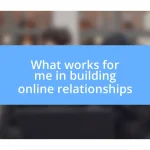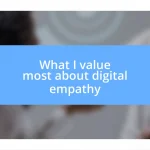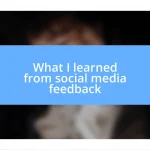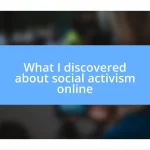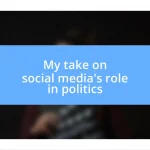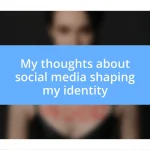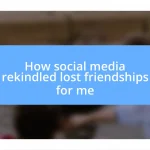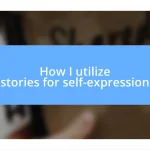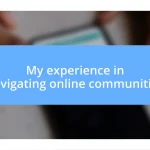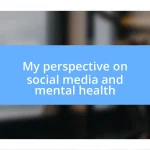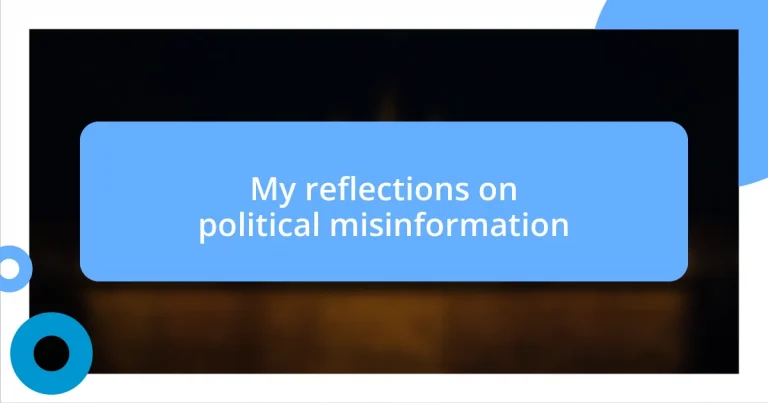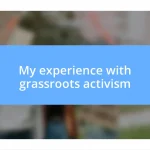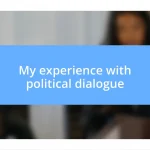Key takeaways:
- Political misinformation is a mix of fact and fiction that can distort public perception and erode trust in institutions.
- Identifying credible sources requires critical thinking and verification, particularly by cross-referencing information across reliable platforms.
- Promoting media literacy and encouraging open discussions can empower individuals to discern fact from fiction and foster informed civic engagement.
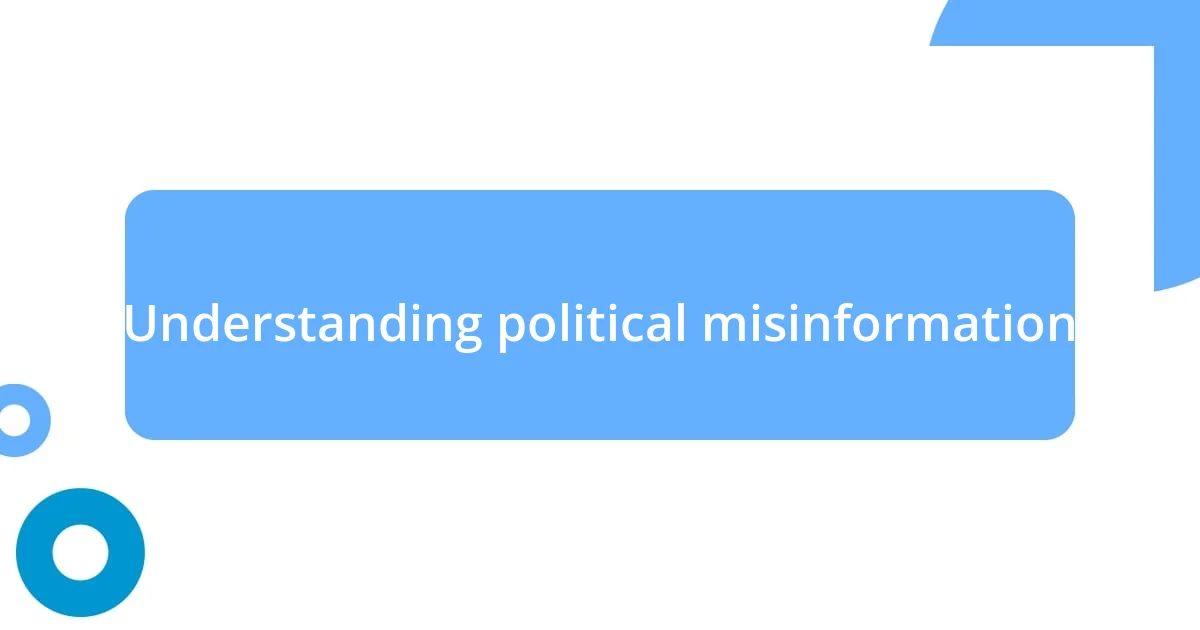
Understanding political misinformation
Political misinformation is often an insidious blend of fact and fiction, designed to manipulate opinions and sway public sentiment. I recall a time when I stumbled upon a social media post that claimed a candidate had a secret plan to impose severe restrictions on personal freedoms. It felt alarming, but curiosity led me to dig deeper, and I discovered it was entirely fabricated. How many of us take the time to verify claims before becoming emotionally invested?
I’ve often wondered why people gravitate towards misinformation, as if it fills a void in their understanding of complex political issues. This ties into our desire for simplicity in a world that’s anything but straightforward. I remember discussing a heated topic with friends over coffee, and it was striking how different interpretations of the same news event led to intense debates. It left me questioning how easily we accept narratives that align with our beliefs, further complicating our relationship with the truth.
One aspect that constantly baffles me is the role of trust in our information sources. I’ve experienced that moment of doubt when I see supposedly credible sites sharing contradictory information. It makes me feel vulnerable and frustrated—who can we genuinely trust anymore? Navigating this landscape of political misinformation requires not just critical thinking but a deep commitment to seeking out the truth, which is often buried beneath layers of falsehoods.
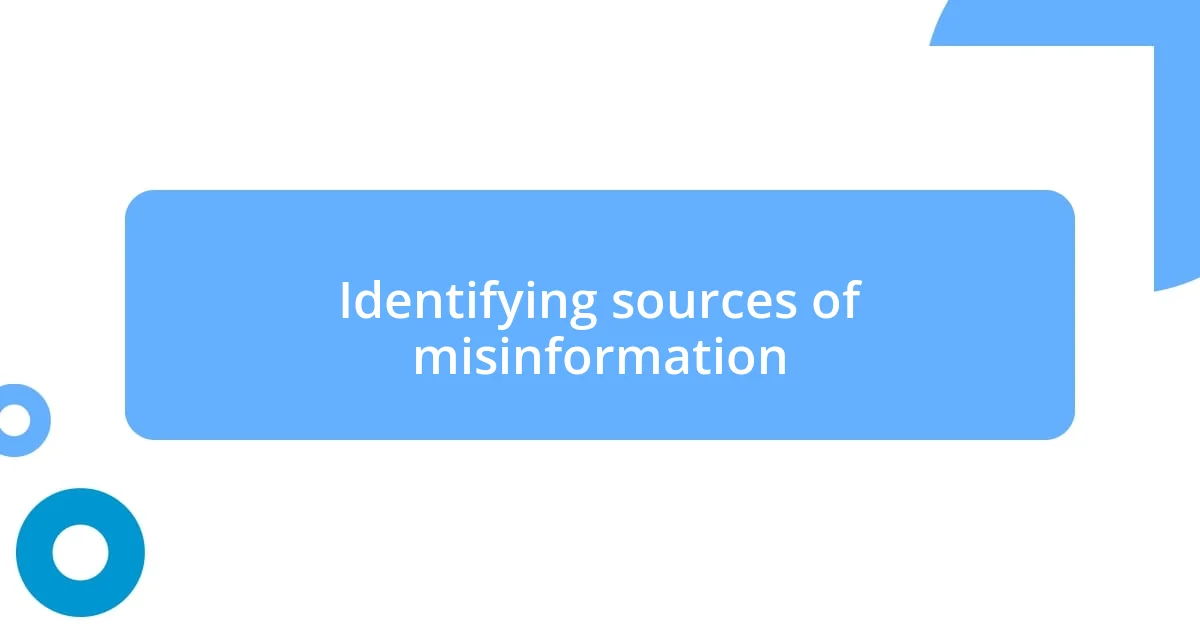
Identifying sources of misinformation
Identifying the sources of misinformation can often feel like peeling back the layers of an onion—there’s so much beneath the surface. I remember a time when a friend shared an alarming article about a local politician’s supposed criminal record. The headline screamed for attention, but when I went to the source, I realized it was a clickbait site with no real credibility. It’s crucial to look beyond flashy headlines and verify the origins of what we read.
The distinction between reliable and unreliable sources can sometimes be blurred. I’ve found it’s helpful to trust organizations that have a track record of transparency and fact-checking. I once followed a sensational news piece only to find that reputable sources had debunked it hours later. Comparing the information from multiple outlets can often reveal discrepancies that help clarify the truth.
Even more telling is the financial motivation behind certain information outlets. I recall a discussion about how subscription-based news platforms operate differently than ad-revenue-dependent sites. Those relying on ads can sometimes prioritize sensationalism over reliability, affecting the way content is presented. Understanding these dynamics can enhance our ability to discern credible sources from those aiming to mislead.
| Source Type | Characteristics |
|---|---|
| Credible News Outlets | Fact-checked content, editorial standards, transparency |
| Clickbait Websites | Exaggerated headlines, sensationalism, little to no sources |
| Social Media | User-generated content, variable reliability, viral potential |
| Opinion Blogs | Personal bias, subjective interpretation, may lack sources |
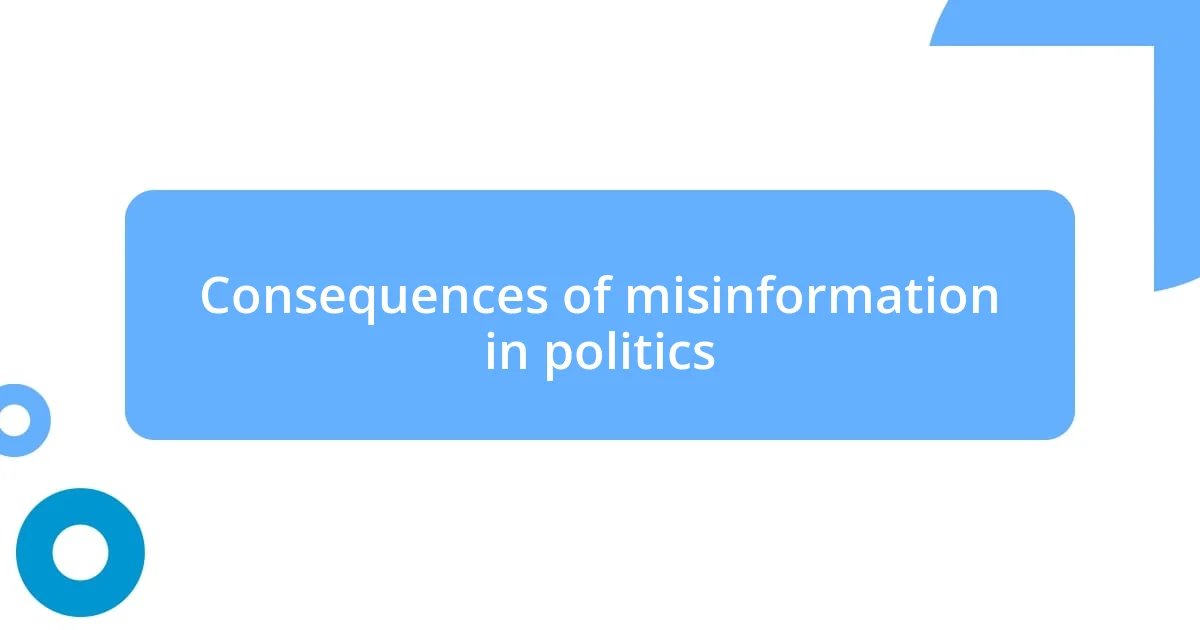
Consequences of misinformation in politics
Misinformation in politics can lead to severe consequences that ripple through society, affecting public trust and participation in the democratic process. I remember attending a community forum where heated debates erupted over issues based on misleading information. It struck me how passionately people defended their beliefs, unaware that they were standing on a foundation of falsehoods. This not only breeds division but also makes it challenging to find common ground, ultimately undermining the principles of democracy.
- Erosion of trust in institutions and media
- Increased polarization and division among citizens
- Deterred voter participation and engagement
- Heightened susceptibility to manipulation by political actors
- Distorted public policy debates and decision-making processes
As I’ve observed, the long-term impact of misinformation means we must all be more vigilant. The narratives we consume shape our realities, and misinformation can twist those realities in damaging ways. For instance, I recall a conversation with a neighbor who was convinced that proposed policy changes would directly harm our community, largely due to misleading social media posts. Our dialogue highlighted not just the misinformation but the damaging effects it had on civic engagement. It made me realize that we all have a role to play in fostering a more informed electorate.
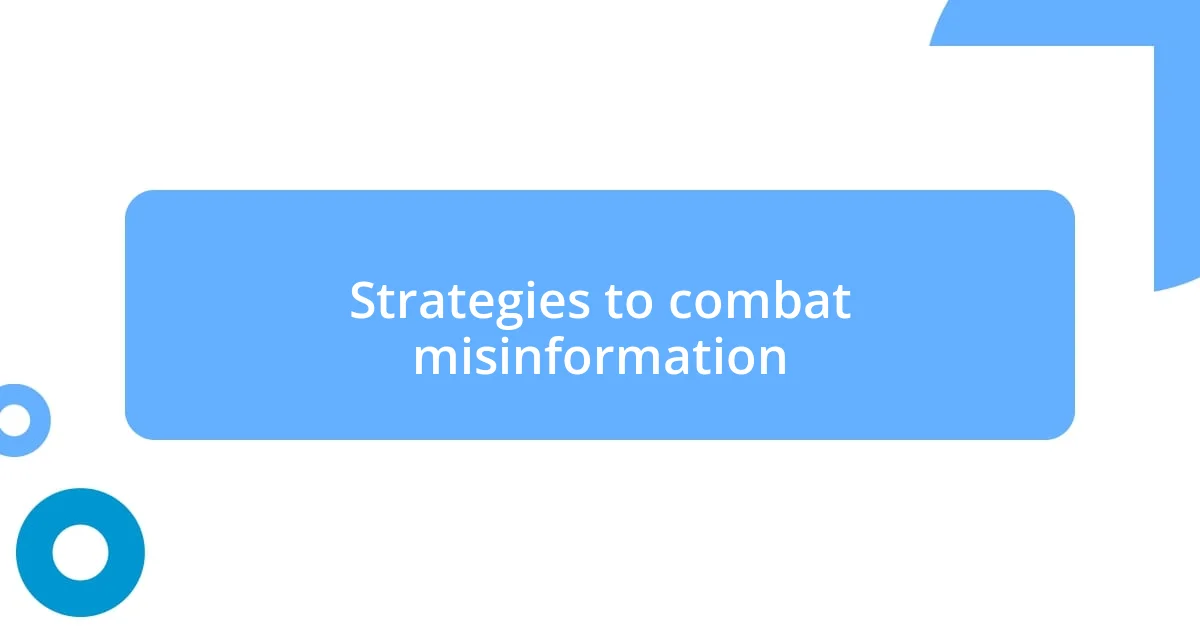
Strategies to combat misinformation
I’ve found that one of the most effective strategies to combat misinformation is through education—specifically media literacy. This is not just about knowing where to look for information; it’s about understanding how information is crafted. I recall a workshop I attended that focused on dissecting headlines and recognizing bias. It really opened my eyes to the subtle ways content can be manipulated. Imagine how different our conversations could be if everyone had this skill!
Another crucial approach is fostering open dialogue within our communities. I often see how discussing contentious topics warmly can create a safe space for people to voice their opinions while remaining receptive to correction. During a recent neighborhood gathering, we tackled a controversial issue together. It was refreshing to watch participants shift their stance after hearing reliable facts, all while feeling respected. This kind of interaction not only addresses misinformation but builds trust among community members.
Moreover, I believe that supporting fact-checking organizations plays a significant role in addressing misinformation. Whenever I come across a suspicious claim, I make it a point to check it against trusted fact-checking sites. There was a time I stumbled upon a viral post claiming a politician had made an outrageous statement. After a quick fact-check, I found it was completely fabricated, and I was able to alert friends before they shared it further. This small act reminded me that each of us holds the power to mitigate misinformation, one share at a time.
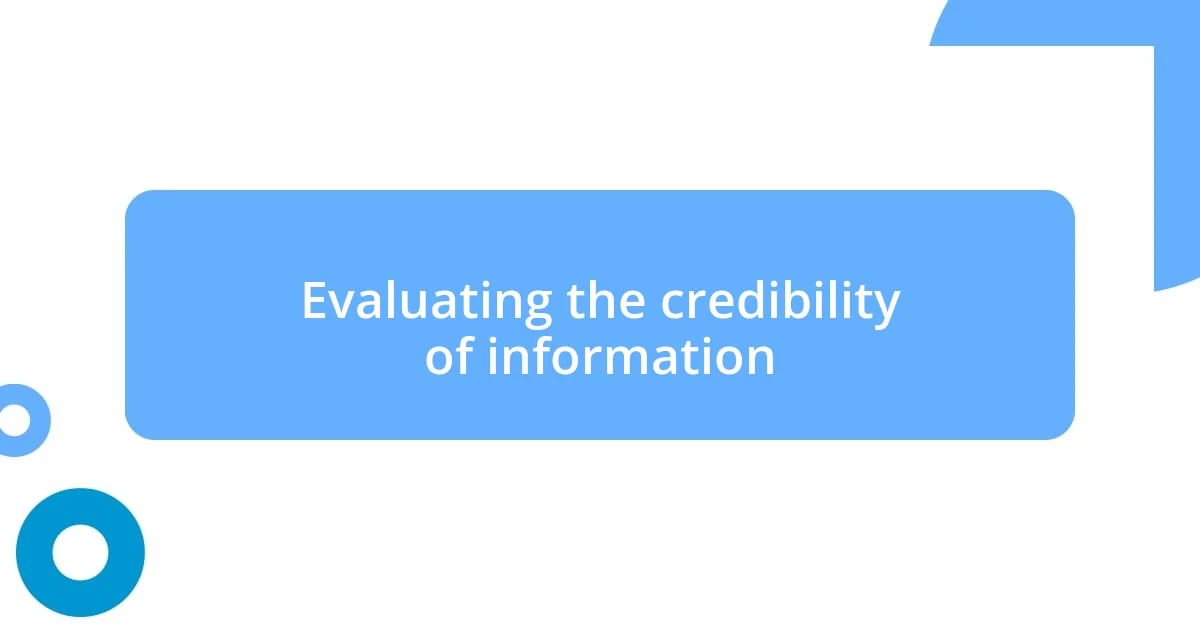
Evaluating the credibility of information
When I come across information, I always ask myself: who’s behind it and what’s their motive? The other day, I found an article that seemed sensational. A quick look revealed it was sponsored by a group with a vested interest in swaying public opinion. It illustrated perfectly how essential it is to consider the source of our information—trustworthiness often hinges on transparency.
I’ve also experienced the power of cross-referencing facts. There was a time a friend shared a sensational statistic about voter fraud, claiming it had skyrocketed. Intrigued yet skeptical, I took the time to consult multiple reputable sources. What I discovered was eye-opening: the figure, while true, was taken out of context and manipulated for a different agenda. Moments like that make me realize that critical thinking can be our best defense against misinformation.
I believe we can all be proactive in our information consumption. Have you ever stopped to think about how often we accept headlines at face value? A few weeks ago, I initiated a conversation with a family member who was convinced by a headline they’d seen online. As we dove into the actual content, we unearthed a series of misleading claims. Those discussions not only clarify misinformation but also create a richer understanding of the complexities surrounding political topics. Embracing skepticism has become part of my approach, truly making me feel empowered to discern fact from fiction.
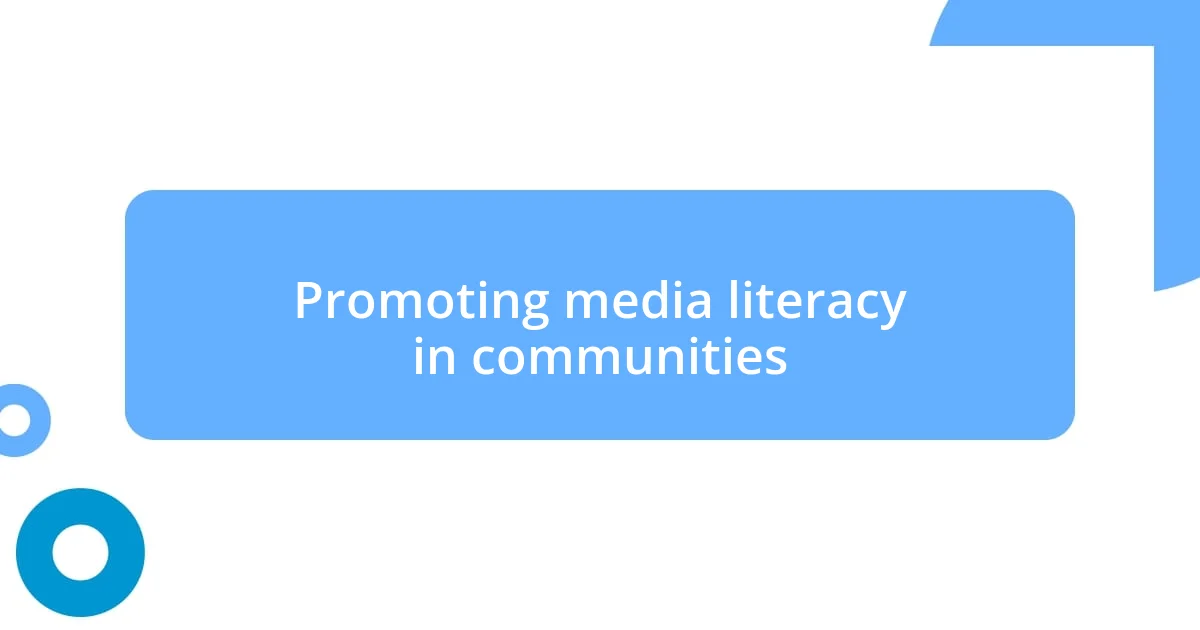
Promoting media literacy in communities
Promoting media literacy in our communities is an essential step in fostering informed citizens. Recently, I volunteered for a community workshop focused on digital literacy, and I was taken aback by the range of ages and backgrounds represented. Attendees expressed how overwhelmed they felt when confronted with competing information online. It made me realize that when we equip individuals with the skills to analyze and question the information they encounter, we’re not just teaching them to be savvy consumers; we’re empowering them to be thoughtful contributors to society.
I often think about how media literacy can transform conversations at the dinner table. One night, while discussing a trending news story, I noticed my cousin repeating a viral meme as if it were fact. Instead of dismissing him, I asked questions to get him to think critically: “What do you think motivates the creator of that meme?” It became a light-hearted but profound exchange, and I could see the gears turning in his mind. Opening up that space for dialogue not only clarified the misinformation but strengthened our bond. It reaffirmed my belief that when we engage one another in discussions about media, we cultivate a more discerning perspective collectively.
I can’t help but wonder how much easier it would be to navigate the news landscape if everyone took the time to check their sources like I have started doing. Just the other day, I stumbled upon a shocking claim regarding a public figure that set social media ablaze. Before sharing, I remembered a lesson from a media literacy class I attended: verify before you amplify. After a brief search, I found the original context and discovered it was a gross misrepresentation. It left me with a sense of responsibility—encouraging others to adopt this practice could dramatically reduce the spread of misinformation. How liberating would that be for our communities to be filled with informed voices?
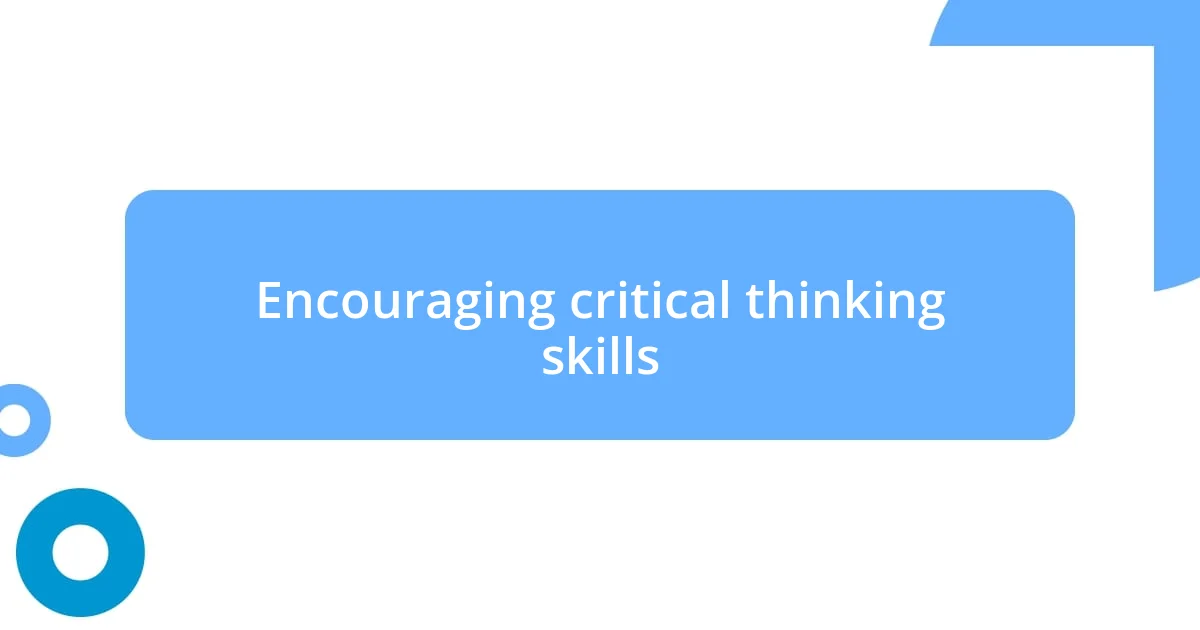
Encouraging critical thinking skills
Encouraging critical thinking skills is crucial in a world flooded with information. I remember sitting in a coffee shop when a stranger at the next table held forth about a political issue he clearly felt passionate about. Instead of simply nodding along, I found myself interjecting with questions: “What evidence do you have for that?” and “How do you know it’s accurate?” Initially, he seemed taken aback, but as we talked, I could see his gears turning—he started to reconsider his points, which was an energizing moment for both of us.
It’s fascinating how a simple question can spark deeper reflection. One afternoon, I encountered an article that claimed a drastic change in a local policy. My immediate reaction was to share it; it seemed compelling. However, I paused and asked myself, “Is the evidence solid?” After doing a bit of digging, I found nuanced reports that contradicted the article’s swift conclusions. That moment taught me that building critical thinking skills doesn’t just involve questioning others; it’s equally vital to question our own instincts. Have you ever stopped to think about how often our first reactions can lead us astray?
The journey of cultivating critical thinking skills often begins with our interactions. I once had a lively debate with a group of friends who were convinced by a viral video that misrepresented a public event. I encouraged them to think analytically: “What’s missing from this narrative?” The subsequent discussion led us to diverse resources and interpretations we hadn’t considered before. Watching my friends shift their perspectives, realizing the complexity of the issue, filled me with hope. It’s moments like these that remind me of the power we wield; fostering critical thinking not only sharpens our own views but also shapes the discourse in our communities.

